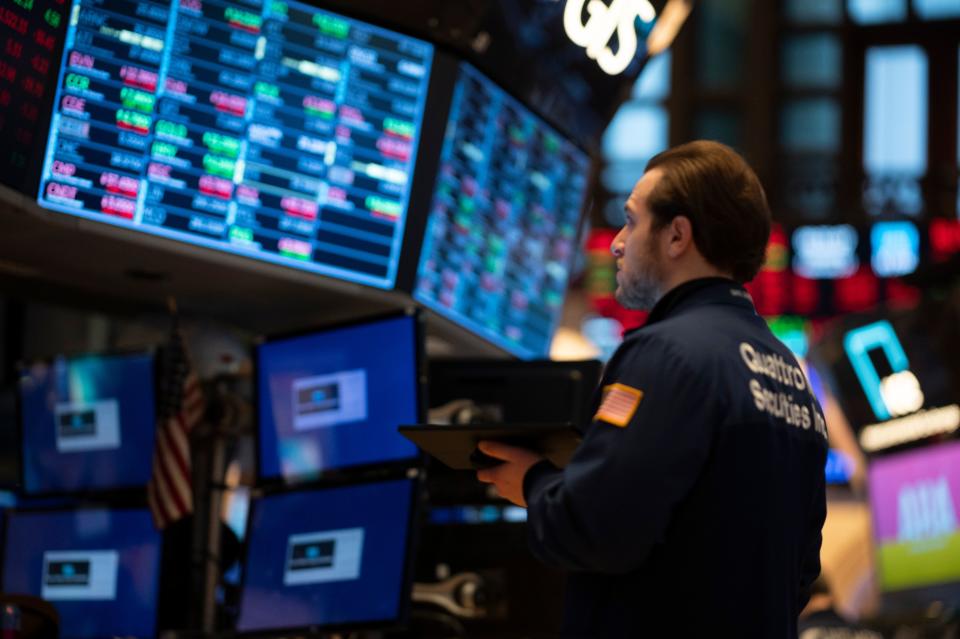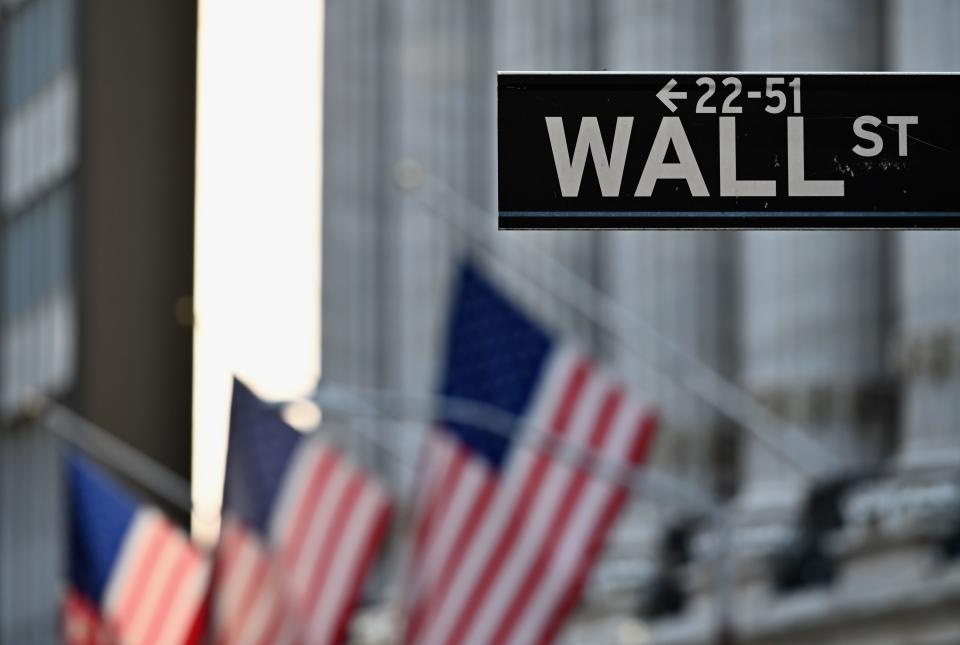The week the COVID-19 second wave hit stock markets

Global governments have been grappling with record-breaking coronavirus spikes, and deaths continue to rise across Europe and the US.
As a result, financial markets across the globe have sold-off sharply as concerns mount amid tighter COVID-19 travel restrictions and with local, national and global curfews in full effect.
Investors’ worries about the steps governments might take to control new infections was heightened as EU countries tightened COVID-19 rules in the region this week.
EU’s second-largest economy, France reverted to a second national lockdown on Friday, which will last until 1 December. This includes bars and restaurants being closed, domestic travel and public gatherings being banned.
Tighter restrictions were imposed in Germany — Europe’s biggest economy — and Switzerland on Wednesday.
The Europe-wide Stoxx 600 index (^STOXX) tumbled 5.6% this week. The DAX (^GDAXI) lost 8.6% since trading began on Monday in Frankfurt. In Paris, the CAC 40 (^FCHI) lost 6.4% in the week.
The UK could also be heading towards a second national lockdown, with West Yorkshire the latest region to go into Tier 3 restrictions on Monday. UK prime minister Boris Johnson is said to be considering a month-long lockdown across England next week.
A study from Imperial College London and Ipsos Mori also reveals that the government’s efforts to curtail the pandemic in England have not succeeded in reducing the spread of COVID-19, with infection rates doubling every nine days and an estimated 960,000 people carrying the virus in England on any one day.
Meanwhile, in the past month the FTSE 100 (^FTSE) — the leading benchmark for UK stocks — has slumped by more than 3% to below 5,600 points. It shed more than 4% this week alone.
The MSCI All-Country World Index (ACWI), which tracks global stocks, dropped 1.2% on Friday.
Watch: Strong GDP data limits European sell-off
READ MORE: Global stocks sell-off continues but strong GDP limits losses in Europe
Financial analyst at AJ Bell, Laith Khalaf, said: “It’s surprising it’s taken markets this long to take fright at the second wave of the pandemic, and the havoc it might wreak on the global economy. The writing has been on the wall for several weeks now, but stock markets have had their blinkers on.
“Until the virus is contained, there can be no clear direction for markets in the short term. We can expect sharp sell offs and relief rallies in line with the ebb and flow of the virus, and the unfolding economic damage it leaves behind."
Stock markets in Europe had their worst week since June. European stocks saw a decline in the first three days of this week, but there was some reprieve after a calmer day on Thursday on the back of GDP data.
On Thursday, the European Central Bank (ECB) left its monetary policy unchanged, but warned the outlook for the European economy was worsening and laid the groundwork for fresh stimulus in December.
President Christine Lagarde acknowledged the eurozone economy was “losing momentum more rapidly than expected.”
On Friday, European stocks had looked set for a fresh rout as COVID-19 infection rates and new lockdown curbs in France and Germany spooked investors, with futures contracts down sharply before markets opened.
But flash estimates for third-quarter GDP in leading European economies beat analysts’ expectations and limited losses. With France, Italy, Germany and Spain all reporting quarter-on-quarter growth.

In America the situation was not much better. Wall Street suffered its worst day in more than a month on Wednesday with the S&P 500 (^GSPC) falling 3.53% — its biggest one-day drop since 11 June. It also endured its worst week and month since March after it reported a new daily record of 88,521 COVID-19 cases.
The S&P 500 closed down 1.2% for a weekly fall of 5.6% and a 2.8% drop in October. Dow’s (^DJI) average was off 0.6% on Friday, 6.5% on the week and 4.6% on the month.
Meanwhile, the tech-heavy Nasdaq (^IXIC) shed more than 2% on Friday, more than 5% over five days and was 2.3% lower for the month.
It comes in spite of strong results from Facebook (FB), Google’s parent company Alphabet (GOOG) and Amazon (AMZN) as a string of US tech giants reported their earnings on Thursday, with investors seemingly hungry for even greater growth.
Data from S&P Global shows that $2.6tn (£2tn) had been wiped off global stock markets by Thursday close.
READ MORE: A Biden victory 'won't solve Europe's problems'
"It’s been an awful end to another tumultuous month this week — with little calm on the horizon heading into November,” Connor Campbell, a financial analyst at SpreadEx, said.
Outside the pandemic, the looming US presidential election also weighed on markets.
Campbell added: “Next week is one of those ridiculously stacked periods that sees four or five headline stories all jostle for investors’ attention. Of course, there’s the election on Tuesday, the aftermath of which will run well beyond Wednesday due to a) the way mail-in votes are being counted in certain states, and b) the potential resistance Trump will put up if he loses.
“Alongside that there’s a likely stimulus-expanding Bank of England meeting at Thursday lunchtime, a post-election Fed statement on Thursday evening, and October’s nonfarm jobs report on Friday. And that’s not to mention the ever-present coronavirus lockdown concerns that have so wrecked the markets in the past few days."
Research analysts at Barclays are hopeful that Phase 3 trial results from three different companies over the coming weeks may provide some light at the end of the tunnel and boost sentiment. But, even a successful vaccine is unlikely to become widely available before the second quarter in 2021.
While economic trouble looks inevitable, analysts predict the damage could be less severe “this time around” with many businesses and, importantly, schools remaining open.
“Government support programs are being extended and targeted more precisely, which should provide much needed cushion to activity, although the slow progress on the EU recovery fund is problematic,” Barclays Equity Market Review reports says.
The report said: “Our economists expect the ECB to materially boost its policy support at the December meeting, with a 6-month €500bn ($582bn, £450bn) PEPP extension, an increased monthly APP pace and further easing of TLTRO terms. Also, the resurgence of the virus is mainly seen across Europe and the US, but not in China/Asia, and is thus less global.”
Watch: What is a V-shaped economic recovery?

 Yahoo News
Yahoo News 